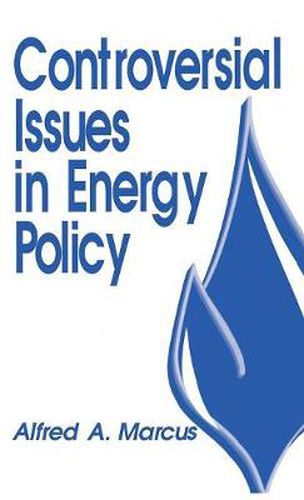Readings Newsletter
Become a Readings Member to make your shopping experience even easier.
Sign in or sign up for free!
You’re not far away from qualifying for FREE standard shipping within Australia
You’ve qualified for FREE standard shipping within Australia
The cart is loading…






A key long-term challenge faced by the United States and other leading world economies is breaking the link between economic growth and oil consumption. The energy price shocks of 1973 and 1979 showed the fragility of these dependent relationships and their impact on world politics. Alfred Marcus ably examines U.S. energy policymaking and reveals both the shortcomings and failures–as well as the surprising successes–of past energy-policy efforts. Following a review of events that transpired in the Persian Gulf after August, 1990, Marcus examines worldwide trends in energy production/consumption since the first energy-supply crisis of 1973. Ensuing chapters discuss the economics and politics of energy policy, the role(s) of markets and governments, and parts played by supplier and user nations from countries to cartels. Unique to this text is Marcus’s review of U.S. policies and reactions to energy shortages as compared with the experiences of other major consuming nations (Japan, France, and Great Britain). At a time when energy policy is among the most important issues in world politics, Controversial Issues in Energy Policy skillfully outlines new and enduring issues of energy policy for academics and students in public policy, political science, public administration, and economics, as well as policy makers.
Marcus provides a valuable insight into the dynamics of policy and politics around a vitally important resource.
–Political Studies Association
$9.00 standard shipping within Australia
FREE standard shipping within Australia for orders over $100.00
Express & International shipping calculated at checkout
A key long-term challenge faced by the United States and other leading world economies is breaking the link between economic growth and oil consumption. The energy price shocks of 1973 and 1979 showed the fragility of these dependent relationships and their impact on world politics. Alfred Marcus ably examines U.S. energy policymaking and reveals both the shortcomings and failures–as well as the surprising successes–of past energy-policy efforts. Following a review of events that transpired in the Persian Gulf after August, 1990, Marcus examines worldwide trends in energy production/consumption since the first energy-supply crisis of 1973. Ensuing chapters discuss the economics and politics of energy policy, the role(s) of markets and governments, and parts played by supplier and user nations from countries to cartels. Unique to this text is Marcus’s review of U.S. policies and reactions to energy shortages as compared with the experiences of other major consuming nations (Japan, France, and Great Britain). At a time when energy policy is among the most important issues in world politics, Controversial Issues in Energy Policy skillfully outlines new and enduring issues of energy policy for academics and students in public policy, political science, public administration, and economics, as well as policy makers.
Marcus provides a valuable insight into the dynamics of policy and politics around a vitally important resource.
–Political Studies Association